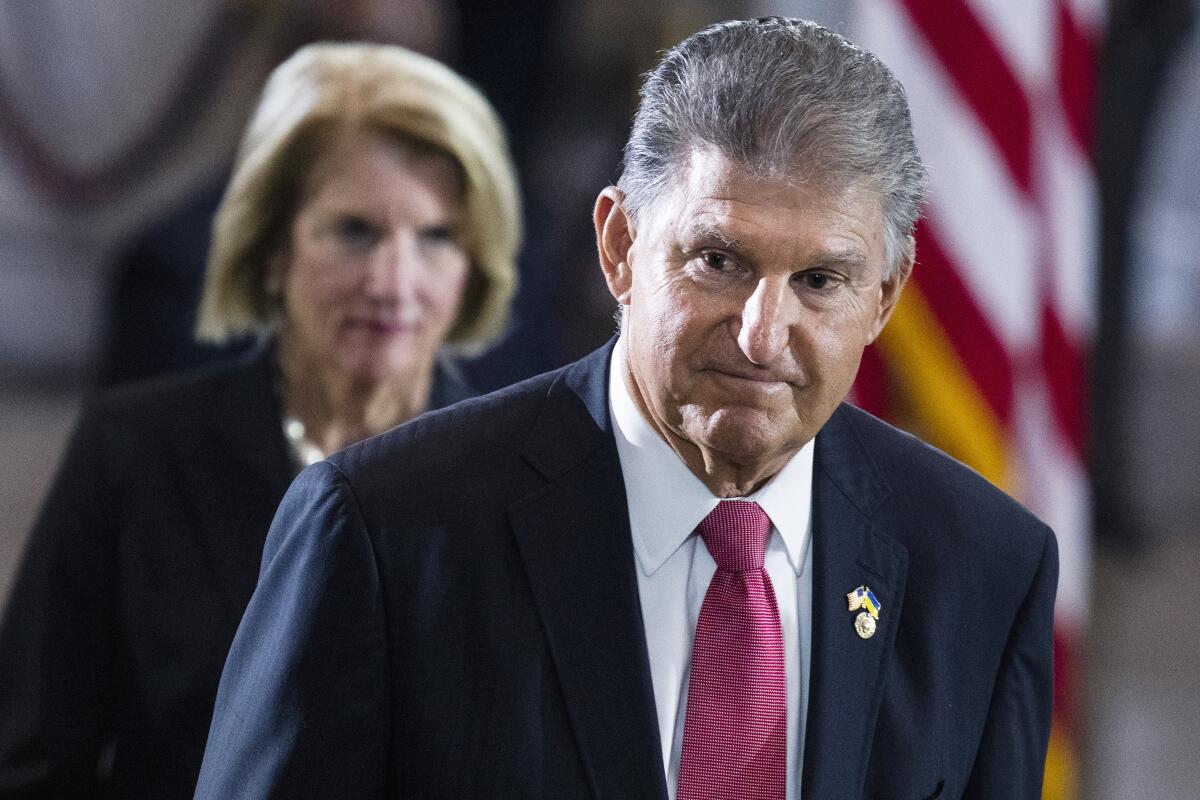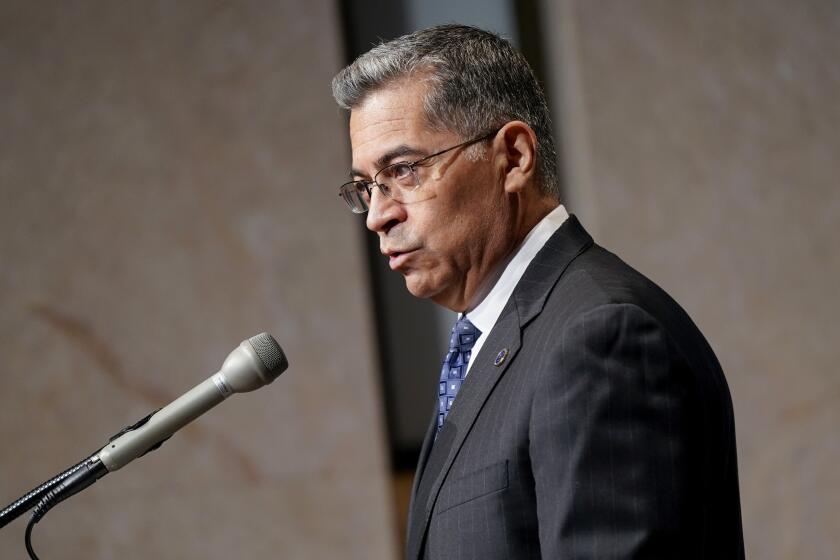Sen. Manchin opposed to energy, tax provisions in downsized economic bill, Democrat says

WASHINGTON — Sen. Joe Manchin III (D-W.Va.) has said he’ll oppose an economic measure he’s been negotiating with Democratic leaders if it includes climate or energy provisions or higher taxes on the rich and corporations, a Democrat briefed on the conversations said late Thursday, delivering a blow to one of the party’s top election-year priorities.
The official said Manchin, who derailed his party’s bigger and wider-ranging social and environment package in December, told Senate Majority Leader Charles E. Schumer on Thursday that he will support a new measure only if it is limited to curbing pharmaceutical prices and extending federal subsidies for buying healthcare coverage.
Manchin’s demands leave the measure’s future unclear, seemingly upending the hopes of President Biden and Democratic leaders for a more sweeping package they could push through Congress by August. That would have let them show Democratic voters that they were addressing various party priorities, including curbing climate change and taxing the rich, and draw a contrast with Republicans, who are expected to oppose the legislation unanimously.
Manchin spokesperson Sam Runyon issued a statement that reiterated the senator’s assertions that he did not want any measure that emerged to worsen the consumer cost of living. The government reported this week that inflation last month reached an annual level of 9.1%, the highest figure in four decades.
“Political headlines are of no value to the millions of Americans struggling to afford groceries and gas as inflation soars to 9.1%,” Runyon said. “Sen. Manchin believes it’s time for leaders to put political agendas aside, reevaluate and adjust to the economic realities the country faces to avoid taking steps that add fuel to the inflation fire.”
Manchin signaled unease with the negotiations Wednesday, saying the latest inflation figures left him feeling “more cautious than I’ve ever been” about agreeing to a package that could fuel further inflation increases.
The Biden administration is warning pharmacies not to discriminate against women who may seek reproductive health prescriptions, including some that might be involved in ending a pregnancy.
The official who described the talks was not authorized to discuss them publicly and spoke on condition of anonymity.
Biden and congressional Democrats have been hoping to enact a roughly $1-trillion version of the $2-trillion bill that Manchin refused to support in December and tout it as an achievement before the November elections. Republicans, who hope to capture House and Senate in the fall voting, say the new measure would worsen inflation by boosting spending and raising taxes.
Manchin, one of Congress’ most conservative Democrats, has enormous leverage, much to the dismay of many in his party. Using special budget rules, Democrats can push a package through the 50-50 Senate if they are solidly united, along with Vice President Kamala Harris’ tie-breaking vote.
They also control the House, though narrowly. Recent grumbling from some moderates there about raising taxes — an easy campaign-season target for Republicans — has raised questions about the fate of tax boost proposals in that chamber.
Top Democrats have wanted to reach agreement and approve the measure before Congress begins its August recess. Progress on major legislation is much harder in the autumn of election years, when every vote can become the target of a barrage of attack ads in campaigns.
However, containing the costs of prescription drugs and extending subsidies for people buying health insurance under President Obama’s 2010 healthcare law are also top Democratic priorities. Manchin’s stance puts his party in the position of having to decide whether it should reluctantly declare victory by solely addressing some of its healthcare goals, as opposed to demanding more but potentially ending up with nothing.
A government watchdog has found that Secret Service agents deleted text messages sent and received around the Jan. 6, 2021, attack on the U.S. Capitol after an inspector general requested them as part of the investigation into the insurrection.
White House spokesman Nick Conger declined to comment on Manchin’s position.
Senate Finance Committee Chairman Ron Wyden (D-Ore.) called Democrats’ legislation “our last chance to prevent the most catastrophic and costly effects of climate change.” But he said the party must “salvage as much of this package as possible. The expression that failure is not an option is overused, but failure really is not an option here.”
“It seems odd that Sen. Manchin would choose as his legacy to be the one man who single-handedly doomed humanity. But we can’t throw in the towel on the planet,” said John Podesta, founder of the liberal Center for American Progress, who said Biden should use his executive powers to take climate action.
“It’s outrageous that Manchin and the Republican Party have killed climate legislation this Congress,” said Brett Hartl, government affairs director at the Center for Biological Diversity. He said Biden should instead use executive powers to block new fossil fuel projects and prevent new oil and gas drilling.
In talks with Schumer (D-N.Y.) that have lasted months, Manchin previously expressed support for energy and climate language and for raising taxes on high earners and big companies.
Just this week, two Democratic aides said bargainers were planning to include a proposal to extend the solvency of Medicare for three more years by applying an existing 3.8% tax on the wealthiest Americans to many people who earn income from tax-advantaged business entities called “pass throughs.” Asked about that, Runyon said Manchin has always supported keeping Medicare solvent and reducing pharmaceutical costs.
At issue is whether federal regulations on safe drugs could override state laws, and if so, give women a legal option where abortion is banned.
According to the official, Schumer had told Manchin during their talks that he would support using half of the overall measure for deficit reduction, a Manchin demand.
Schumer also said he would back setting aside $375 billion for climate and energy provisions, the official said. He also told Manchin he would back provisions aimed at helping domestic energy drilling — the West Virginian is a strong supporter of coal and domestic oil production — and would not include tax credits for electric vehicles, which Manchin had largely opposed.
The official said that even so, the resulting measure would have included clean-energy tax credits and trimmed carbon emissions by almost 40% by 2030, according to Democratic estimates.
More to Read
Get the L.A. Times Politics newsletter
Deeply reported insights into legislation, politics and policy from Sacramento, Washington and beyond. In your inbox three times per week.
You may occasionally receive promotional content from the Los Angeles Times.













